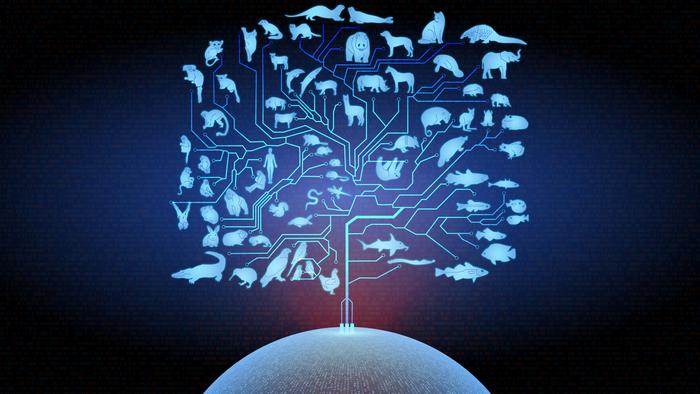A groundbreaking development in evolutionary biology and computational genomics has emerged from the University of California San Diego, promising to revolutionize our understanding of biodiversity. A multidisciplinary team of engineers and computer scientists has unveiled a novel tool named ROADIES, designed to infer species trees from raw genome data with unparalleled speed, accuracy, and automation. The innovation behind ROADIES addresses persistent challenges in phylogenetic analysis by eliminating the need for genome annotation and orthology inference, two laborious and computationally intensive steps that have traditionally slowed scientific progress in this domain.
Phylogenetic trees, or species trees, are fundamental frameworks that allow scientists to decode the evolutionary relationships among species, offering insights not only into the history of life but also into practical fields such as drug discovery, zoonotic disease control, and conservation biology. Constructing these trees typically requires experts to select genetic markers, annotate genomes, and establish orthologous relationships among genes—a process that is both time-consuming and requires considerable domain expertise. ROADIES sidesteps these obstacles by implementing a fully automated pipeline that operates directly on raw genome assemblies, democratizing access to accurate phylogenetic inference for a broad range of researchers.
At the core of ROADIES lies a clever strategy that relies on the random sampling of genomic loci rather than predetermined protein-coding genes or functional markers. This choice defies conventional wisdom, which holds that only carefully selected, conserved genomic regions can produce reliable phylogenetic signals. Yet, UC San Diego’s research, led by Yatish Turakhia and published in the prestigious journal Proceedings of the National Academy of Sciences, demonstrates that random loci sampling not only simplifies the data processing but also maintains, or even enhances, adherence to evolutionary models, resulting in species trees that match those derived from more laborious methods.
This random sampling approach, coupled with novel computational algorithms, allows ROADIES to forgo genome annotation entirely. Genome annotation—the process of identifying and labeling functional elements within a DNA sequence—is a major bottleneck that usually requires extensive manual input and computational power. By bypassing this requirement, ROADIES drastically reduces the time and resources needed to move from raw sequencing data to evolutionary insights, a leap forward that could catalyze a new wave of comparative genomic studies.
Another significant hurdle conquered by ROADIES is the issue of orthology inference. Orthology involves distinguishing between genes in different species that originated from a common ancestral gene, a process complicated by gene duplication events that produce multiple gene copies across genomes. Many extant phylogenetic tools struggle with paralogs—these duplicated genes—leading to inaccuracies if misclassified. ROADIES incorporates sophisticated algorithms developed in the lab of Siavash Mirarab that accept multi-copy genes without relying on explicit orthology assignments. This discordance-aware methodology ensures robust phylogenetic inference even when faced with complex gene family histories.
The implications of removing these two major steps—annotation and orthology inference—are profound. ROADIES can process extensive datasets containing hundreds of genomes, inferring species trees that are concordant with expert-generated, large-scale phylogenies but require only a fraction of the computational investment. The scalability of ROADIES opens doors for its application to the massive genomic datasets expected in upcoming biodiversity projects, such as the Earth BioGenome Project, which aims to sequence nearly every eukaryotic life form on the planet.
The study showcased ROADIES’s impressive performance across a diverse array of taxa, including placental mammals, pomace flies, birds, and budding yeasts. The tool’s versatility highlights its applicability across the tree of life, underscoring its potential as a game-changer in evolutionary research. By facilitating rapid and automated species tree inference, ROADIES not only accelerates phylogenomic studies but also broadens participation in this research area beyond specialized bioinformatics groups.
Looking ahead, the team behind ROADIES plans to enhance the tool’s capabilities further. One exciting avenue is the implementation of algorithms for the placement of new taxa on preexisting species trees, making incremental updates more feasible. Additionally, leveraging GPU computing resources could exponentially increase throughput, enabling the phylogenetic analysis of tens of thousands—or even hundreds of thousands—of genomes, aligning with the scale of current and future genomic sequencing endeavors.
The potential applications of ROADIES extend beyond academic research. By enabling faster identification of functional genomic regions and evolutionary patterns, this technology could expedite the development of new pharmaceuticals, provide early warnings for zoonotic disease outbreaks, and inform targeted conservation strategies for vulnerable species. The tool’s capacity to integrate complex genetic data at scale represents a substantial leap forward in translating genomic information into actionable knowledge.
With genome assembly technologies continuously improving and sequencing becoming more accessible, the bottleneck in extracting meaningful evolutionary insights has shifted towards computational analysis. ROADIES epitomizes the next generation of bioinformatics tools, characterized by automation, accuracy, and scalability. The research community eagerly anticipates the widespread adoption of ROADIES, which promises to accelerate discoveries in evolutionary biology and related fields.
In conclusion, the advent of ROADIES marks a pivotal moment in phylogenetics. By reimagining how species trees can be inferred from raw genomic data, this tool paves the way for a deeper, more comprehensive understanding of the tree of life. The work of Turakhia, Mirarab, and colleagues exemplifies the synergy of engineering and biology, setting a new standard for innovation in the life sciences. As large-scale sequencing initiatives progress, tools like ROADIES will be indispensable in unlocking the secrets held within the genomes of Earth’s astonishing diversity.
Subject of Research: Not applicable
Article Title: Accurate, scalable, and fully automated inference of species trees from raw genome assemblies using ROADIES
News Publication Date: 2-May-2025
Web References:
https://www.pnas.org/doi/10.1073/pnas.2500553122
References:
Turakhia, Y., Mirarab, S., et al. (2025). Accurate, scalable, and fully automated inference of species trees from raw genome assemblies using ROADIES. Proceedings of the National Academy of Sciences. https://doi.org/10.1073/pnas.2500553122
Image Credits: Artwork by Alice Grishchenko
Keywords: Phylogenetics, Genome mapping




